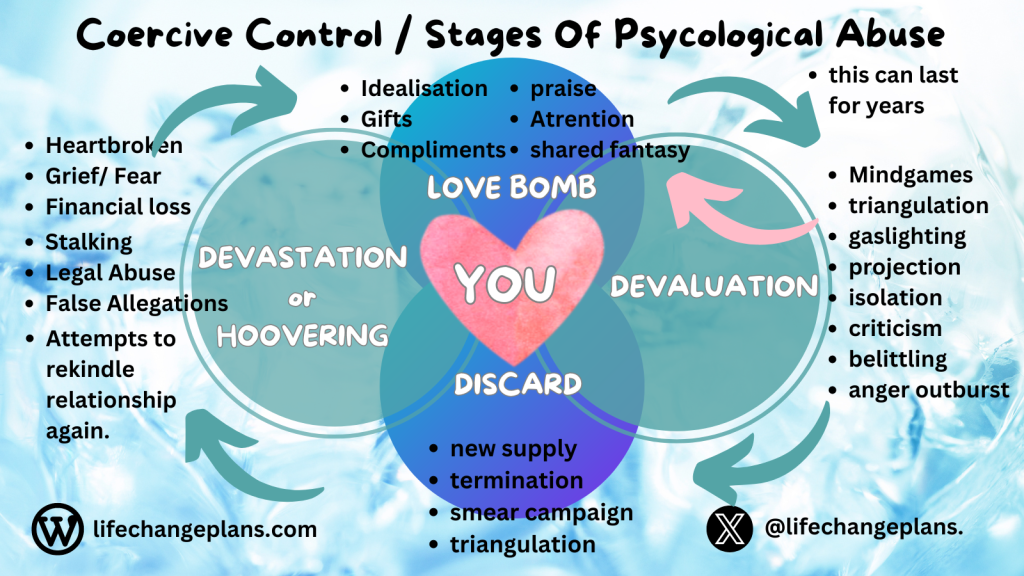In the complex world of narcissistic abuse, one tactic stands out for its insidiousness and emotional devastation: future faking. This term may be unfamiliar to some, but the impact is all too real for those who have experienced it. Future faking is a manipulative strategy used by narcissists to create an illusion of a promising future with their partner. Then, they shatter those dreams and hopes later on. This tactic is designed to keep the victim emotionally invested in the relationship. Unknown to the victim, all the while giving the narcissist control and power.
What is Future Faking?
Future faking occurs when a narcissist makes grand promises about the future to their partner. These promises can include plans for marriage, starting a family, buying a home together, travelling the world, or even retirement plans. The key here is that these promises are often highly detailed and designed to seem real and attainable. The narcissist may talk about these plans with enthusiasm and certainty, making the victim believe that a shared future is possible but imminent.
For example, a narcissist might say, “Once we’re married, everything will be perfect,” or “When we retire, we’ll buy that beach house and spend our days in peace.” These statements are crafted to make the victim feel secure in the relationship and to overlook any red flags or abusive behaviour.
However, the reality is that the narcissist has no intention of fulfilling these promises. The future they describe is a fantasy, a tool used to manipulate and control. Over time, as the narcissist begins to devalue their partner, these promises remain unfulfilled, leading to confusion, heartbreak, and a deep sense of betrayal for the victim.
The Manipulative Power of False Hopes
The power of future faking lies in its ability to create false hopes and dreams that the victim clings to, even when the relationship deteriorates. By painting a picture of an idyllic future, the narcissist ensures that their partner remains emotionally invested in the relationship. The victim often excuses or ignores the growing signs of abuse. Or, as I like to say, we brush things under the carpet. We make excuses for their poor behaviour and disrespect.
Victims of future faking often find themselves trapped in a cycle of hope and disappointment. They may rationalize the narcissist’s behaviour by telling themselves that future promises will come true eventually. This hope keeps them tethered to the relationship despite the increasing emotional, psychological, and sometimes even financial abuse they endure.

The emotional manipulation is profound. The victim is led to believe that if they just try harder or if they just wait a little longer, the future the narcissist promised will materialize. This keeps the victim in a state of anxiety and uncertainty, constantly striving to please the narcissist in the hopes of realizing those shared dreams. This is the push-pull scenario or what I have termed; he loves me, he loves me not.
The Devaluation Phase: From Promises to Pain
As the relationship progresses, the narcissist typically enters the devaluation phase. This is when the grand promises of the future start to fade, and the narcissist begins to show their true colours. The victim may notice a shift in the narcissist’s behaviour—what was once affection and admiration turns into criticism, humiliation, and blame.
The narcissist may start to belittle the very dreams they once promised. For example, they might say, “Why would we ever get married? Look at how you behave,” or “We’ll never retire together if you keep acting this way.” These statements are designed to undermine the victim’s self-esteem and sense of security. The victim, who has invested emotionally in the relationship based on the promises made, is left confused, hurt, and increasingly dependent on the narcissist’s approval.
The devaluation phase is psychologically damaging because it directly contradicts the future that was so vividly promised. The victim is left questioning themselves, wondering what they did wrong or why they are suddenly being treated so poorly. This emotional whiplash is a key part of the narcissist’s control strategy, keeping the victim off balance and unable to break free.

The Devastating Impact of Betrayal
One of the most painful aspects of future faking is the sense of betrayal that follows. When the narcissist discards the relationship. After months or even years of being led to believe in a shared future. The victim is often abruptly discarded, left to deal with the emotional fallout alone. Adding insult to injury, the narcissist may already have another partner lined up, someone with whom they have likely started the same cycle of future faking.
This betrayal can be deeply traumatic for the victim. Realizing that the future they believed in was nothing more than a manipulation can shatter their self-esteem and sense of reality. They may struggle with feelings of worthlessness, questioning their judgment and wondering how they could have been so deceived.
The narcissist’s post-separation abuse compounds the trauma of betrayal. The behaviour often includes threats, intimidation, emotional, psychological, and financial abuse. The narcissist may attempt to destroy the victim’s reputation, cut off their financial resources, or continue to manipulate them through legal or other means. This ongoing abuse can make it incredibly difficult for the victim to heal and rebuild their life.
Rebuilding After Future Faking: A Path to Recovery
Recovering from future faking is challenging, but it is possible with the right support and strategies. The first step is to recognize that you were a victim of manipulation. It’s important to understand that the promises made were never about you or your worth; they were tools of control used by the narcissist. You might like to read. “Why do victims of domestic abuse have anger?”
Healing from this experience requires rebuilding your self-esteem and sense of self-worth. This can be done through therapy, support groups, and self-care practices focusing on nurturing your emotional well-being. Surround yourself with people who genuinely care about you and can provide a supportive, non-judgmental environment.
It’s also crucial to set boundaries to protect yourself from further manipulation. This may mean cutting off all contact with the narcissist, if possible, and focusing on your own needs and recovery. Learning to trust yourself again is key to moving forward. This can be achieved by setting small, manageable goals and celebrating your progress as you achieve them.
Visualizing a positive future for yourself—one that is free from the narcissist’s influence—can help you reclaim your life. This involves letting go of the false promises and creating new, realistic goals that align with your values and desires.
Conclusion: Moving Forward
Future faking is a cruel and calculated tactic used by narcissists to manipulate and control their victims. By creating false hopes and dreams of a future together, the narcissist keeps their partner emotionally invested, even as they begin to devalue and discard them. The trauma of betrayal and the challenges of post-separation abuse can make it difficult for victims to rebuild their lives.
However, by recognizing the manipulation for what it is and taking steps to heal, victims can break free from the cycle of abuse. Rebuilding self-esteem, setting boundaries, and creating a new, positive future are essential to recovery. Remember, the future is yours to create—one based on truth, self-respect, and genuine relationships.
If this resonates with your experience or if you know someone going through a similar situation, sharing this article might give them the understanding and encouragement they need to begin their healing journey.
You can also join the Author in a no-cost, zero-commitment support community.
Trauma to Transformation for women aged 40+
Subscribe To The YouTube Channel for Positive Mindset Affirmation and more on my Author Journey.


